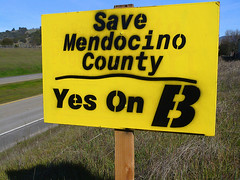 Graphic
Graphic Medical Marijuana Regulation in California
Lately, however, residents of Mendocino County, like those in other parts of California, are wondering if the state’s embrace of marijuana for medicinal purposes has gone too far.
Medical marijuana was legalized under state law by California voters in 1996, and since then 11 other states have followed, even though federal law still bans the sale of any marijuana. But some frustrated residents and law enforcement officials say the California law has increasingly and unintentionally provided legal cover for large-scale marijuana growers — and the problems such big-money operations can attract.
“It’s a clear shield for commercial operations,” said Mike Sweeney, 60, a supporter of both medical marijuana and a local ballot measure on June 3 that called for new limits on the drug in Mendocino. “And we don’t want those here.”
The outcome of the ballot measure is not known, as votes are still being counted, but such community push-back is increasingly common across the state, even in the most liberal communities. In recent years, dozens of local governments have banned or restricted cannabis clubs, more formally known as dispensaries, that provide medical marijuana, in the face of public safety issues involved in its sale and cultivation, including crime and environmental damage.
“If folks had to get their dope, sorry, they would just have to get it somewhere else,” said Sheriff Mark Pazin of Merced County, east of San Francisco, one of the many jurisdictions to impose new restrictions.
Under the 1996 law, known as Proposition 215, patients need a prescription to acquire medicinal marijuana, but the law gave little guidance as to how people were to acquire it. That gave rise to some patients with marijuana prescriptions growing their own in limited quantities, the opening of clubs to make it available and growers going large scale to keep those outlets supplied.
In turn, that led to the kind of worries that have bubbled up in Arcata, home of Humboldt State University, where town elders say roughly one in five homes are “indoor grows,” with rooms or even entire structures converted into marijuana greenhouses.
That shift in cultivation, caused in part by record-breaking seizures by drug agents of plants grown outdoors, has been blamed for a housing shortage for Humboldt students, residential fires and the powerful — and distracting — smell of the plant in some neighborhoods during harvest.
“I naïvely thought it was a skunk,” said Jeff Knapp, an Arcata resident who has a neighbor who is a grower.
In May, Arcata declared a moratorium on clubs to allow the city council time to address the problem. Los Angeles, which has more than 180 registered marijuana clubs, the most of any city, also declared a moratorium last year.
“There were a handful initially and then all the sudden, they started to sprout up all over,” said Dennis Zine, a member of the Los Angeles City Council. “We had marijuana facilities next to high schools and there were high school kids going over there and there was a lot of abuse taking place.”
But while even advocates of medical marijuana say they recognize that the system has problems, they question the bans. “I think there’s no doubt there’s been abuse, but there’s probably no system created by human beings that hasn’t been abused,” said Bruce Mirken, the director of communications for the Marijuana Policy Project in Washington, which promotes the drug’s legalization. “But the answer to that is not the wholesale throwing out the baby with the bath water.”
All told, about 80 California cities have adopted moratoriums with more than 60 others banning the clubs outright, according to Americans for Safe Access, which advocates for medical marijuana research and treatment. Eleven counties have adopted some sort of ban or moratorium.
Such laws have led to a kind of Prohibition patchwork of “wet” and “dry” areas. In Visalia, a city of 120,000 in the state’s Central Valley, the local club was denied a permit on Main Street, so instead set up shop on a lonely section of country highway. Other clubs have retreated into people’s homes.
Kris Hermes, legal campaign director for Americans for Safe Access, said that despite the bans, 8 counties and about 30 cities had also established regulations meant to legitimize the clubs.
Mr. Zine said the moratorium in Los Angeles would allow city officials time to develop regulations and zoning, something advocates for medical marijuana say they welcome.
- 1
- 2
Jigar Mehta and Carolyn Marshall contributed reporting.
(Page 2 of 2)
“There’s tons of human behavior that you and I might not want to have anything to do with,” said Allen St. Pierre, the executive director of the National Organization for the Reform of Marijuana Laws, or Norml, a nonprofit advocacy group in Washington. “But if they are legal, there ought to be a legal means to purchase the commodity and do business.”
Skip to next paragraphSuch regulations were passed in 2005 in San Francisco, which now has a 10-page application for a club permit.
Kevin Reed, owner of the Green Cross, was the first owner to get a permit in January. But he said some of the city’s other two dozen clubs were struggling to get their paperwork. “It’s taking substantially more time to move through the permit process than was envisioned,” Mr. Reed said in an e-mail message. The city’s board just extended the permit deadline until next year.
New regulations are also in the offing for local and state law enforcement, which has often found itself confused by the overlapping — and sometimes contradictory — federal, state and local laws. Under a state law that took effect in 2004, counties can set their own limits on the amount of medical marijuana; in Mendocino, for example, growers are allowed 25 mature plants, while most counties allow six.
Jerry Brown, the state attorney general, plans to release guidelines this summer to clarify the differences.
“These dispensaries aren’t supposed to be big profit centers,” Mr. Brown said. “This is supposed to be for individual use.”
The 2004 law also recognized the right of patients and caregivers to cultivate marijuana as a group, something law enforcement officials say has been abused.
Bob Nishiyama, the major crimes task force commander in Mendocino County, said there were places with 500 plants and 20 Proposition 215 letters tacked to a fence. “And technically, that’s legal because people can have 25 plants,” he said.
By any measure, medical marijuana in California is a moneymaker. In March, a group of California club owners testified before the state Board of Equalization that their industry had pumped some $100 million in sales tax into state coffers, representing more than $1 billion in sales.
Like many law enforcement officials, Mr. Nishiyama says he does not have a problem with medical marijuana, just with those who are exploiting it.
“If you’re growing six plants and smoking it in your own house, I could care less,” he said.
Most states that have passed subsequent medical marijuana laws have been more precise than California voters were in 1996. New Mexico, for example, allows only patients with seven medical conditions, including cancer, AIDS and epilepsy, to receive medical marijuana.
“California is an aberration, because it does not designate specific disease types, it does not designate weights or plant source, and it has what might be the most fungible or elastic definition of care-giver,” said Mr. St. Pierre, of Norml. Every proposition after Proposition 215 has been “narrower and narrower and more restrictive in scope,” he said.
Also complicating law enforcement’s job is that marijuana is still illegal in the eyes of the federal government, which has been increasingly aggressive about prosecuting club owners they feel have crossed the line into commercial drug dealing.
Among those recently convicted in California include a doctor and his wife from Cool who were given five years each in March for conspiracy to sell marijuana and growing more than 100 plants; a club owner from Bakersfield who pleaded guilty in March to possession of 40 pounds of marijuana with intent to distribute; and Luke Scarmazzo, a 28-year-old club owner and aspiring rapper who faces 20 years to life in prison after a conviction last month for running a multimillion-dollar club in Modesto that the government called a criminal enterprise.
And last year, the Drug Enforcement Administration threatened to seize buildings from landlords who rented space to clubs, resulting in some closings across the state.
For all the federal and local opposition, marijuana as medicine has become an accepted part of life in many communities in California. Advocates say the drug helps patients with everything from the wasting effects of chemotherapy and AIDS to treatment of anxiety and headaches.
But it is not cheap. At Med X, the raided Los Angeles club, the most expensive marijuana, called Blueberry Kush, was priced at $490 an ounce. That economic impact includes numerous ancillary businesses that serve the cannabis culture, including thriving horticulture shops, and Oakland’s Oaksterdam University, a trade school where students can sign up for semester-long courses on marijuana cultivation.
For some, growing has become a second career. In Arcata, a 29-year-old man, who asked that his name not to be used for fear of arrest, said that he earned about $25,000 every three months from selling marijuana grown in a back room to club owners from Southern California.
But others in Arcata are less welcoming. Kevin L. Hoover, the editor of the local newspaper, The Eye, has made a practice of confronting people he believes are growing marijuana. Their houses are easy to spot, he said — covered windows, tall fences, cars coming and going late at night. “Sometimes the whine of fans,” he said.
Those fans, of course, are eating electrical power, something that also irks many.
“We’re all trying to reduce our carbon footprint, but in these places the meters are spinning off the wall,” said Mayor Mark Wheetley of Arcata. “When do you say, enough is enough?”





























